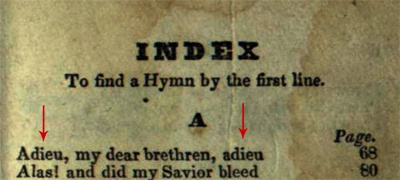
FAIR is a non-profit organization dedicated to providing well-documented answers to criticisms of the doctrine, practice, and history of The Church of Jesus Christ of Latter-day Saints.
mNo edit summary |
m (→Response) |
||
| Line 11: | Line 11: | ||
The Book of Mormon is a ''translation.'' This means that it is no more likely that the word ''adieu'' appeared on the plates than the words ''yea'', ''beginning'', or ''sword''. | The Book of Mormon is a ''translation.'' This means that it is no more likely that the word ''adieu'' appeared on the plates than the words ''yea'', ''beginning'', or ''sword''. | ||
''Adieu'' is Joseph's translation of a concept expressed by Jacob. | ''Adieu'' is Joseph's translation of a concept expressed by Jacob. In French, ''adieu'' implies "farewell until we meet with God." This is a fitting finale to Jacob's testimony and writing. | ||
Joseph Smith was likely unaware that ''adieu'' was a French word. Like many words that were originally French, ''adieu'' was adopted into English | Joseph Smith was likely unaware that ''adieu'' was a French word. Like many words that were originally French, ''adieu'' was adopted into English— it was in use by at least 1374. | ||
===The Declaration of Independence=== | ===The Declaration of Independence=== | ||
| Line 31: | Line 31: | ||
</blockquote> | </blockquote> | ||
=== | ===John Wesley's=== | ||
The Wesley brothers, founders of Methodism, used ''adieu'' in some of their hymns: | The Wesley brothers, founders of Methodism, used ''adieu'' in some of their hymns: | ||
;Hymn 285: I'll bid this world of noise and show/ With all its glittering snares, adieu! [http://www.ccel.org/w/wesley/hymn/jwg02/jwg0285.html *] | ;Hymn 285: I'll bid this world of noise and show/ With all its glittering snares, adieu! [http://www.ccel.org/w/wesley/hymn/jwg02/jwg0285.html *] | ||
;Hymn 809: VAIN, delusive world, adieu...[http://www.ccel.org/w/wesley/hymn/jwg08/jwg0809.html *]{{ref|wesley1}} | ;Hymn 809: VAIN, delusive world, adieu...[http://www.ccel.org/w/wesley/hymn/jwg08/jwg0809.html *]{{ref|wesley1}} | ||
Furthermore, John Wesley was fond of ''adieu'', using it many times in his personal letters. A few examples follow; more are available[http://www.google.com/custom?q=adieu&btnG=Search&safe=vss&cof=GL%3A0%3BT%3A%23000000%3BLC%3A%230000FF%3B&domains=wesley.nnu.edu&sitesearch=wesley.nnu.edu *] | |||
;5 January 1763 to Charles Wesley:"We join in love to you both. My wife gains ground. She is quite peaceable and loving to all. Adieu!"[http://wesley.nnu.edu/john_wesley/letters/1763.htm *] | |||
;17 May 1742 to Charles Wesley:Let all the brethren pray for me. Adieu![http://wesley.nnu.edu/john_wesley/letters/1742.htm *] | |||
;15 December 1772 to Charles Wesley:My love to all. Adieu![http://wesley.nnu.edu/john_wesley/letters/1772b.htm *] | |||
; 16 December 1772 to Mrs. Bennis:My dear sister, adieu[http://wesley.nnu.edu/john_wesley/letters/1772b.htm *] | |||
===Use Among LDS Members=== | ===Use Among LDS Members=== | ||
[[Image:Emma_hymn_book_2.jpg |right|frame|Index page from the 1835 book of hymns chosen by Emma Smith for use in the Church. Original from BYU library.[http://contentdm.lib.byu.edu/cgi-bin/docitemview.exe?CISOROOT=/NCMP1820-1846&CISOPTR=533 *]]] | [[Image:Emma_hymn_book_2.jpg |right|frame|Index page from the 1835 book of hymns chosen by Emma Smith for use in the Church. Original from BYU library.[http://contentdm.lib.byu.edu/cgi-bin/docitemview.exe?CISOROOT=/NCMP1820-1846&CISOPTR=533 *]]] | ||
Closer to home, | Closer to home, hymn #52 (penned by a non-LDS author) collected by Emma Smith for the use of the Church, ''adieu'' is used twice in the first line: | ||
:Adieu, my dear brethren adieu, | :Adieu, my dear brethren adieu, | ||
| Line 47: | Line 53: | ||
:Till we on mount Zion shall stand.{{ref|hymn1}} | :Till we on mount Zion shall stand.{{ref|hymn1}} | ||
Clearly, this was a word familiar to Joseph and his contemporaries. | Clearly, this was a word familiar to Joseph and his contemporaries. The Church's the ''Times and Seasons'' periodical used the word 19 times. | ||
==Conclusion== | ==Conclusion== | ||
Jacob 7:27 ends with the phrase, "Brethren, adieu." Critics claim that because adieu is French, it shows that Joseph Smith composed the Book of Mormon, and not an ancient author.
The Book of Mormon is a translation. This means that it is no more likely that the word adieu appeared on the plates than the words yea, beginning, or sword.
Adieu is Joseph's translation of a concept expressed by Jacob. In French, adieu implies "farewell until we meet with God." This is a fitting finale to Jacob's testimony and writing.
Joseph Smith was likely unaware that adieu was a French word. Like many words that were originally French, adieu was adopted into English— it was in use by at least 1374.

Thomas Jefferson's original draft of the Declaration of Independence read, in part (beginning shown in image by blue underline):
Jefferson later crossed out "everlasting Adieu," and replaced it with "eternal separation."[2]
Noah Webster's 1828 American dictionary demonstrates that it was perfectly good English:
ADIEU', Adu'.
- Farewell; an expression of kind wishes at the parting of friends.
ADIEU', n. A farewell, or commendation to the care of God; as an everlasting adieu.
The Wesley brothers, founders of Methodism, used adieu in some of their hymns:
Furthermore, John Wesley was fond of adieu, using it many times in his personal letters. A few examples follow; more are available*

Closer to home, hymn #52 (penned by a non-LDS author) collected by Emma Smith for the use of the Church, adieu is used twice in the first line:
Clearly, this was a word familiar to Joseph and his contemporaries. The Church's the Times and Seasons periodical used the word 19 times.
"Adieu" is simply one English word among many in the Book of Mormon translation. It was in common use among members and non-members in Joseph's era. Critics try to confuse this issue simply because its French origins are more apparent to the general reader. All its presence indicates is that the concept which Jacob intended to communicate was "farewell forever, or until we meet God."

FAIR is a non-profit organization dedicated to providing well-documented answers to criticisms of the doctrine, practice, and history of The Church of Jesus Christ of Latter-day Saints.
We are a volunteer organization. We invite you to give back.
Donate Now